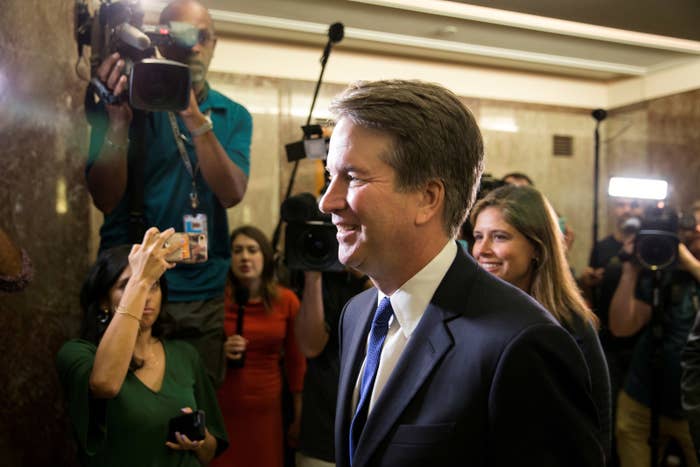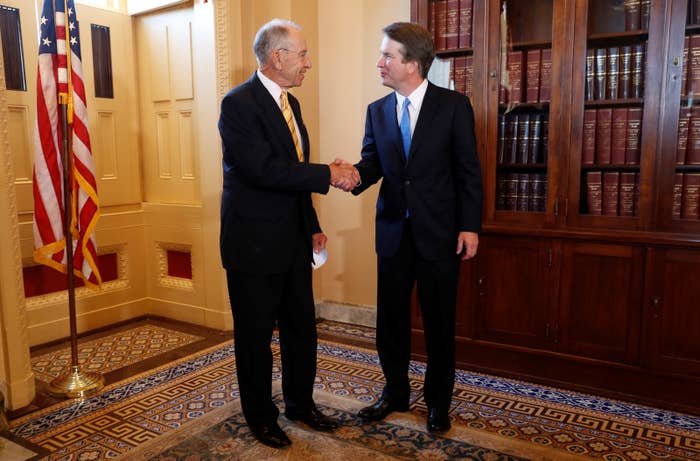
Republicans’ approach to the millions of documents from Supreme Court nominee Brett Kavanaugh’s time in the administration of former president George W. Bush has been to do whatever it takes to keep the nomination moving forward swiftly.
The result has been that many documents from Kavanaugh’s White House work — including those from his time as staff secretary, the person responsible for coordinating the flow of paper to the president — are not being reviewed by the Senate at all, and others, from his time in the White House counsel’s office, are being withheld through a process that avoids some of the requirements of congressional requests made under the Presidential Records Act.
Most notably, despite the news that the Trump administration is keeping more than 100,000 pages of documents from the Senate Judiciary Committee based on executive privilege claims, the process being used to provide the documents to the Senate has, thus far, meant that no one actually has had to invoke executive privilege to do so.
Instead, an informal process has operated — involving lawyers for Bush voluntarily turning over documents to the committee after lawyers for President Donald Trump tell them what documents to withhold.
With a Republican majority in the Senate and a majority vote being all that’s required now to confirm Supreme Court justices, the only thing that can stop Kavanaugh from taking retired Justice Anthony Kennedy’s seat on the Supreme Court is Republican senators breaking ranks with their party or Democrats taking control of the Senate before the nomination is voted on. The first looks unlikely currently, and the second, even if it were to happen, would take time.
So, the Republicans’ path for addressing the millions of pages of documents in Kavanaugh’s file is to minimize the size of the file being turned over to the Senate and to move out the ones that are going to be made public quickly. Senate Judiciary Chair Chuck Grassley’s request for documents, the Bush lawyers’ route for providing them, and the Trump administration’s method of addressing the document request all have advanced those goals.
The first step came from Grassley, who unilaterally limited his committee’s request for documents under the section of the Presidential Records Act that allows congressional access to former presidents’ documents when necessary and under certain conditions. In his July 27 letter to the George W. Bush Presidential Library, which is part of the National Archives and Record Administration (NARA), Grassley noted Kavanaugh’s time — from 2003 to 2006 — as staff secretary but only asked for records regarding his time from 2001 to 2003 in the White House Counsel’s Office, as well as records about his nomination to the US Court of Appeals for the DC Circuit.
The archives’ review — under the Presidential Records Act, a subsequent executive order signed by former President Barack Obama, and regulations — would lead to a determination of what documents the archives would intend to release.
That decision would be followed by an opportunity for the former president — in this case, Bush — and the current president to review the documents and assert executive privilege if they wished. Under the executive order signed by Obama, “If the President decides to invoke executive privilege, the Counsel to the President shall notify the former President, the Archivist, and the Attorney General in writing of the claim of privilege and the specific Presidential records to which it relates. After receiving such notice, the Archivist shall not disclose the privileged records unless directed to do so by an incumbent President or by a final court order.”
In an Aug. 2 letter to Grassley, however, NARA’s general counsel told him the process of NARA’s review of the requested documents — the step before the presidents’ review for privilege claims — wouldn’t conclude until late October.

That led to the second step — what Grassley’s office referred to this weekend in a news release as the “Bush Presidential Records Team.” Headed by William Burck, a partner at Quinn Emanuel, the team of lawyers from his firm, as well as lawyers at Kirkland & Ellis and Baker Botts, requested the same set of documents that Grassley had sought from NARA. Under a separate provision of the Presidential Records Act, the records of former presidents are available to those former officeholders.
They then created a side-by-side process that was going on at the same time NARA’s process was taking place. Of course, the goal of this secondary process was speed. The records, they argued, could be more expeditiously reviewed and turned over to the committee under this process.
Many documents from Kavanaugh’s time in the counsel’s office were turned over to the committee under this process, in terms of pure numbers. However, the 100,000-plus pages not being turned over, which became public on Friday, gives light to one of the downsides of this process.
This is step three.
A public assertion of privilege under the presidential records process would require Trump himself to assert the privilege and to detail “the specific presidential records” for which he is invoking executive privilege.
Such a move could lead to pushback from congressional leaders, as happened in the 1980s when the Reagan White House tried to withhold records from William Rehnquist’s time in the Nixon White House from senators. In that situation, when Rehnquist had been nominated to become chief justice, Mark Rozell details in his 2010 book on executive privilege that two Republicans joined with Democrats in threatening to subpoena the documents if the White House wouldn’t back down. It did, and senators were allowed to review the relevant documents.
Since then, presidents of both parties have declined to invoke executive privilege to shield documents of Supreme Court nominees from Senate review.
A 2005 letter from then-White House counsel Harriet Miers to Sen. Patrick Leahy noted — in conjunction with John Roberts’ nomination to the Supreme Court — that, “as a general matter,” records “will not be withheld” on the basis of “constitutionally-based privilege.”
Five years later, when Elena Kagan was the nominee, the archivist of the US, David Ferriero, noted in a letter to Leahy and the ranking Republican on the committee, then-senator Jeff Sessions, that “President Obama does not intend to assert claims of executive privilege over [the requested] material.”
On Friday, that practice was not followed — and it was done outside of the process that Congress created for addressing presidential records.
In the letter from Burck, he informed the committee that “the White House, after consultation with the Department, has directed that we not provide [27,110] documents,” amounting to 101,921 pages, because they “have been identified as traditionally protected by constitutional privilege.”
A source familiar with the review process told BuzzFeed News that the Trump administration told Bush’s lawyers that they would assert executive privilege over those documents if legally necessary to do so to block disclosure. Because of the process being used to provide the documents to the committee, however, that was not needed. Instead, Bush’s lawyers just held back those documents from senators.
“This is just the latest action in a series of actions to obstruct our review of Brett Kavanaugh’s nomination,” Sen. Dianne Feinstein told BuzzFeed News. “President Trump and Senate Republicans have gone to extraordinary lengths to hide Brett Kavanaugh’s record from the Senate and American people. The only explanation for their actions is that these records would further reveal Kavanaugh's controversial history and ideological views.”
All of that, though, doesn’t necessarily mean the document question is at its end.
It is not clear where the NARA review stands and whether, at some point in the future, Bush or Trump will be forced to directly confront the privilege issues avoided in the side-process.
It also is not clear, however, whether that time will come before a vote on Kavanaugh’s nomination is held.

